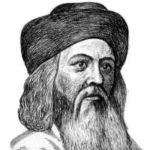Background
Baruch was born in 1757. The grandson of the Baal Shem Tov (q.v), founder of Hasidism, Baruch was a vain and ambitious leader who inherited few of his grandfather’s good qualities.

Baruch was born in 1757. The grandson of the Baal Shem Tov (q.v), founder of Hasidism, Baruch was a vain and ambitious leader who inherited few of his grandfather’s good qualities.
He held court in an autocratic and luxurious manner, but demanded severe asceticism from his followers, as well as expecting them to comply fully with the custom of giving gifts to the rabbi.
Baruch of Medzibezh aroused the opposition of his fellow Hasidic leaders, of whom he was equally contemptuous. After officiating as rabbi in Tulchyn from 1780 to 1788, he was compelled to return to Medzibezh because of opposition from the tzad-dikim.
In 1808 he held a meeting with Shneur Zalman of Lyady, with whom he had a particularly vehement quarrel over the latter’s rationalization of Hasidism.
Notwithstanding his demands on the Hasidim, and his own unconstrained lifestyle, he was admired by his followers.
Believing that a tzaddik (a Hasidic leader) earned his position by virtue of birth and divine appointment, he assumed that his distinguished ancestry gave him special rights in Medzibezh. He also claimed that as a tzaddik's powers are divinely endowed and not given by man, he need not be judged by the same standards as his subjects, that is, he is as justified in serving God by indulgence in material pleasures as by devotion to prayer and a holy ascetic life. He himself chose the former.
Quotations:
Judaism has always reached the summit of its achievement wherever Jewish natural talents and European cultural tradition have met and crossfertilizcd each other.
Fascist dictatorship destroys the results of the political emancipation of the individual, in order to prevent the social emancipation of the masses.
